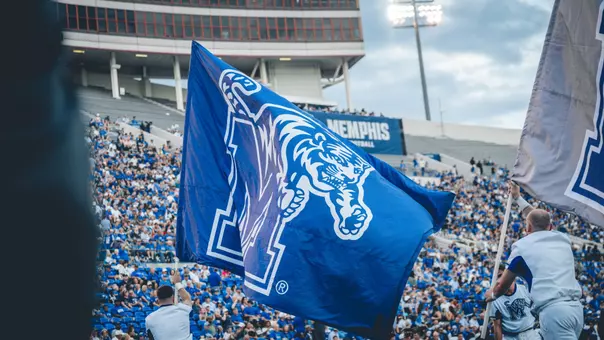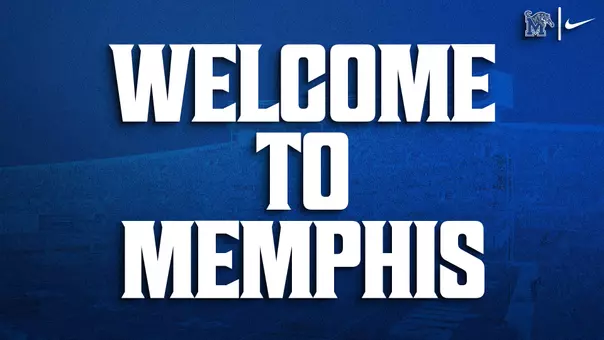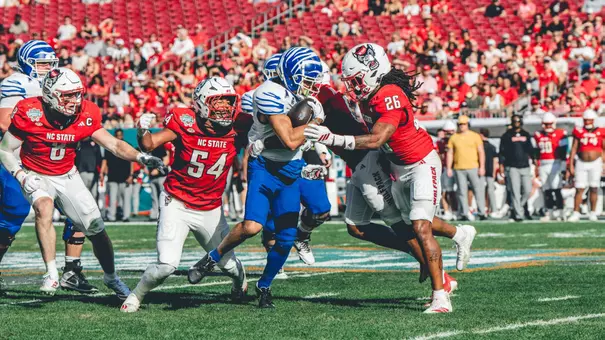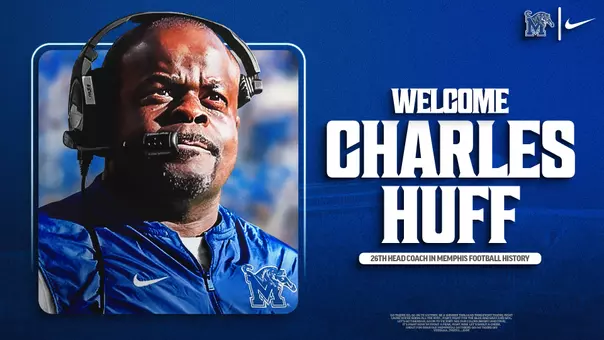University of Memphis Athletics
Football
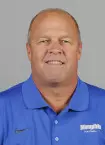
- Title:
- Assistant Head Coach/Running Backs
- Email:
- drdickey@memphis.edu
- Phone:
- 901-678-5119
Darrell Dickey is in his eighth season overall and fifth in his current stint with Memphis in 2017. He served as the program’s offensive coordinator from 1986-89 and returned to the Bluff City in the same capacity in 2012.
In January of 2017, Dickey returned to his offensive coordinator position that he held from 2012-15. He served as the assistant head coach for the 2016 campaign. Since returning to Memphis in 2012, Dickey has mentored the program’s running backs.
In his most-recent tenure that began in 2012, Dickey has played an instrumental role in the program’s turnaround and rise on college football’s national landscape. In the two seasons prior to his arrival, the Tigers won only three games, but Dickey helped changed the program’s image quickly.
The last three seasons, Dickey was a member of the Tigers coaching staff that led the program to a 27-12 record (.692 winning percentage), three-straight bowl appearances and a conference championship. The 27 wins are the most over a three-season period in Tigers history and also placed Memphis among the nation’s top-25 college football programs for wins and winning percentage from 2014-16.
In his third season on staff, Dickey helped guide the Tigers to a share of the 2014 American Athletic Conference crown, the program’s first league championship since 1971. Memphis posted a 10-3 record, tying the school record for most wins in a season (1938). The Tigers capped the 2014 campaign with a thrilling 55-48 double-overtime victory over BYU in the Miami Beach Bowl.
Memphis followed that season with a 9-4 record in 2015. The Tigers began the season 8-0 and climbed as high as No. 13 in the national polls. Memphis also debuted at No. 13 in 2015’s first College Football Playoff (CFP) poll in early November. Memphis ended 2015 with its second-straight postseason appearance, this time an invitation to play in the Birmingham Bowl.
Success for the Tigers was much the same in 2016, even with a coaching change. Memphis posted a third-straight winning campaign (8-5 record) and a third-consecutive winning ledger in conference play (5-3). The Tigers earned a bowl invitation for the third year in a row, this time the Boca Raton Bowl. The three-straight bowls tied the school record for consecutive postseason appearances.
A major reason for Memphis’ recent success has been Dickey’s assistance in developing prolific offenses. In 2016, Dickey helped keep the offensive ship steady in the midst of the coaching staff turnover. The 2016 Tigers offense was the second-best offense in school history, finishing behind only the 2015 offense in total yards (6,028), points (505) and touchdowns (57). Dickey’s ground attack in 2016 featured four backs, including American Athletic Conference Special Teams Player of the Year Tony Pollard, and the quartet accounted for over 96 percent of the rushing yards (1,997 of 2,071 yards). All four backs return for the Tigers – and Dickey – in 2017.
One of those four returning backs is Doroland Dorceus, who has developed his overall game under Dickey’s tutelage. In 2016, Dorceus had his best campaign to date with 810 rushing yards and nine touchdowns. His 810 yards gave him 1,881 for his career, moving him up to the No. 10 spot on the school’s all-time rushing list. He joined the 1,000 yards club as the 31st member in 2015. Dorceus also proved a receiving threat out of the backfield with 292 yards and four scores in his career.
The 2015 Tigers offense, with Dickey as offensive coordinator, rewrote the program’s record book, setting season marks for scoring (522; 40.2 ppg), total touchdowns (59), passing yards (3,997), plays (1,028) and total yards (6,330). Memphis’ offense also ranked among the national and American Athletic Conference leaders in 2015. The Tigers ranked in the top-20 nationally in scoring offense (11th), passing offense (18th), total offense (19th) and red zone offense (18th), and also was among the league’s top-four squads in scoring offense (2nd), rushing offense (4th), passing offense (3rd), total offense (3rd) and red zone offense (3rd).
As they did in 2014, Dickey’s running backs played an integral role in the team’s high offensive numbers in 2015. For a second-straight season, the Tigers running backs rushed for over 2,000 yards (2,333; 179.5 ypg). Memphis rushed for 2,476 yards (190.5 ypg) in 2014. It was the first time the Tigers ran for 2,000 or more yards in consecutive seasons since 2004 and 2005. The Memphis rushing attack scored 29 touchdowns, which are tied for the third-most in a season in program history. Dickey’s 2014 rushing corps accounted for 31 touchdowns, the second-highest total for a season in school history.
The 2014 campaign ended with a share of the American Athletic Conference championship and a Miami Beach Bowl title, and Dickey’s running backs had a hand in one of the most-successful seasons in program history. His rushing attack led the league with 2,476 yards (190.5 ypg) and 31 touchdowns. The 2,476 yards were the seventh-most for a season in school history and the most for a campaign since 2008 (2,533). The 31 rushing scores were the second-most for a season in school history.
In 2014, Dickey mentored Brandon Hayes, a 2012 walk-on that finished his career as Memphis’ fourth-leading all-time rusher (2,385 yards). Hayes’ 949 rushing yards in 2014 were the eighth-most for a season in school history and the most by a Tiger since 2009. Hayes completed his career with six 100-yard rushing performances – all under Dickey – and his six 100-yard rushing games are tied for the fifth-most in school history.
Dickey’s second season (2013) was the program’s transition year to the American Athletic Conference from Conference USA. In 2013, the Tigers averaged 313 yards of total offense and 138 rushing yards. Hayes finished 2013 with 860 yards and five touchdowns and became the first multi-year recipient of the team’s Issac Bruce Offensive Player of the Year Award since DeAngelo Williams.
In his first season in the Bluff City in 2012, Dickey helped turn around a Memphis offense that set the stage for the high-powered attacks that followed from 2014-16. The 2012 Memphis improved its total offensive output by nearly 100 yards – 243 in 2011 to 327.1 in 2012 – in Conference USA games only. In league play, Dickey’s running backs improved the team’s rushing offense by 63 percent.
Dickey, who has nearly 30 years of collegiate coaching experience, joined the Memphis program after serving as co-offensive coordinator and running backs coach at Texas State in 2011. Texas State’s rushing attack averaged 195 yards per game and scored 20 of the team’s 35 offensive touchdowns. In seven of 12 games, the Bobcats tallied at least 200 yards rushing, and the squad registered at least 40 carries in nine games. The Bobcats finished the season with a 6-6 record and averaged 345 yards of total offense.
Dickey made his move to Texas State after spending two seasons as offensive coordinator and running backs coach at New Mexico. He also served as offensive coordinator at Utah State in 2007-08.
During his tenure at New Mexico, Dickey helped install an offense that featured Freshman All-America tight end Lucas Reed and some of the most talented newcomers in the Mountain West Conference. The newcomers included receiver Ty Kirk and running backs Demond Dennis and Kasey Carrier.
At Utah State, Dickey’s 2008 offense produced 1,653 rushing yards, the school’s highest total in nine seasons. In addition, Aggies signal-caller Diondre Borel was one of seven quarterbacks nationally to lead their respective teams in rushing and passing.
Dickey went to Utah State after serving nine years as the North Texas head coach from 1998-2006. He guided the Mean Green to four-consecutive Sun Belt Conference (SBC) championships from 2001-04 with a combined league record of 25-1. Dickey’s overall record in SBC play was 29-11, including a 26-game conference win streak that stretched from 2001-05. North Texas participated in four-consecutive New Orleans Bowls from 2001-04.
He coached North Texas to nine wins for the first time in 23 years in 2003, after winning eight contests a year earlier. In the 2003 New Orleans Bowl, Dickey’s squad suffered a 27-17 loss to Memphis. The Mean Green also had a 7-5 mark in 2004.
Under his direction, North Texas landed 70 players on All-SBC teams, including 39 first team selections. Dickey was named the head coach of the Sun Belt Conference’s 30th Anniversary Team in 2004. Dickey also guided the Mean Green to its first bowl win in 57 years when North Texas defeated Cincinnati in the 2002 New Orleans Bowl.
North Texas produced back-to-back NCAA rushing leaders in Patrick Cobbs (2003) and Jamario Thomas (2004). Cobbs led the nation with 152.7 yards per game in 2003, and Thomas repeated the feat with 180.1 yards per contest in 2004. In his final season at North Texas, Dickey suffered a heart attack on Oct. 13, 2006, but missed just one game. In a nine-month span, Dickey had his gall bladder removed, was diagnosed with diabetes and suffered a heart attack.
The offensive-minded Dickey went to North Texas after serving as offensive coordinator at SMU in 1997. That season, the Mustangs posted their first winning record since the program returned to the playing field in 1989 following the NCAA “Death Penalty.”
He went to SMU after serving as assistant head coach and offensive coordinator at UTEP from 1994-96.
Dickey also was a tight ends coach at LSU from 1991-93, during which time the Tigers upset No. 1-ranked Alabama in Tuscaloosa in 1993. He went to LSU after serving as quarterbacks and running backs coach at Mississippi State in 1990. That season, the Bulldogs beat LSU for the first time in six seasons when running back Tay Galloway ran for 111 yards and two touchdowns.
Dickey was the offensive coordinator at Memphis from 1987-89, after serving one season as Tigers running backs coach in 1986. In his first coaching stint in the Bluff City, the Tigers upset SEC powers Alabama (1987) and Florida (1988). He also served as a graduate assistant at Texas A&M in 1985 when the Aggies won the Southwest Conference title and played in the 1986 Cotton Bowl.
Dickey is the son of Jim Dickey, who was head football coach at Kansas State from 1978-85. He played quarterback for his father and led the Wildcats to the 1982 Independence Bowl, the program’s first bowl game. He also played in the 1982 Blue-Gray All-Star Game. Dickey graduated from Kansas State in 1983 with a degree in business administration.
He and his wife, Tory, have a daughter, Meredith.

